Carly Findlay's Blog, page 15
October 10, 2023
Ichthyosis impacts mental health
I wrote this on World Mental Health Day (10 October) in 2020, it’s still relevant.
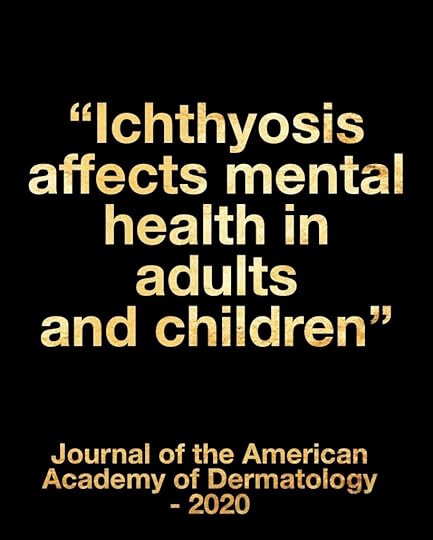
CW: Discrimination, ableism, diverse mental health, suicide
A 2020 study from the American Academy of Dermatology found:
“Many patients with ichthyosis have undetected psychiatric distress. They face harassment, discrimination, and uncomfortable skin symptoms often only relieved by time-consuming treatments.”
From birth, people with Ichthyosis (and our families) are told that our skin is unsightly and needs fixing. By doctors, by well meaning strangers, by the skincare industry and the media. Even the grief from parents and family can impact our self worth.
We experience daily exclusion, bullying and ridicule. We experience discrimination in all areas of life. People are scared to touch us, and embarrassed to be seen with us.
The media affects how we see and love ourselves. These are some actual headlines from media articles:
“The snakeskin woman”
“We’re two rejects who found each other”
“Mother gives birth to a ‘plastic baby’”
“Mum says her baby girl’s skin is like ‘petting a snake’ due to rare skin condition”
These, along with the social media comments on the articles, are so harmful.
It can be hard to love ourselves when we look like this, and when we are ridiculed and excluded.
When I was nine, I didn’t want to live anymore. I told my Mum and Dad I was going to kill myself. The bullying because of my skin was too much to bear. They sought psychiatric help for me immediately. It hasn’t been easy since (I’ve had panic attacks in recent years, and I find the discrimination hangover exhausting) but I’ve found many reasons to live & to thrive with Ichthyosis. And I want to be the person I needed when I was nine.
To those of you struggling with your skin condition – be it Ichthyosis or eczema or another severe diagnosis – you are not alone.
You matter.
You aren’t any of those de-humanising headlines.
You deserve love from yourself and from others.
You should be seen.
It’s ok to seek help.
And I’m so glad you’re still here.
Please – if you see a dermatologist due to a skin condition, ask them to connect you with a counsellor. Talk about how you’re feeling with trusted family, friends, teachers, others with severe skin conditions, and mental health professionals. Don’t be alone.
And if you’re a parent of a child with Ichthyosis, connect them with other children and adults for peer support, and to see what’s possible.
Lifeline: 13 11 14
Kids Helpline: 1800 55 1800
Image:: 1. A selfie of a woman with a red face and short dark curly hair tied back, wearing a navy, orange, blue, purple and yellow floral hoodie, she’s smiling slightly. 2. a black square with gold text. It reads: “Ichthyosis affects mental health in adults and children”
– Journal of the American Academy of Dermatology – 2020
Image: a black square with gold text. It reads: “Ichthyosis affects mental health in adults and children”
Journal of the American Academy of Dermatology – 2020
September 27, 2023
Some thoughts on the eve of the Disability Royal Commission findings being made public
Content warning: abuse, violence, neglect towards disabled people

Today the findings were handed down from the Disability Royal Commission to the Governor General, and tomorrow they will be made public. I, like many disabled people I know, are on tenterhooks. It’s all I can think about. A Minister says the report will “make for disturbing reading”.
The Disability Royal Commission looked into Violence, Abuse, Neglect and Exploitation of People with Disability. More than ten thousand disabled people, our families, disability advocates and disability organisations have given evidence in private hearings, artwork, written submissions and public hearings at the Disability Royal Commission over the last four years.
What I want to see to come out of the Disability Royal Commission:
For human rights to be upheld.
A Disability Ministry focused on the holistic experience of being disabled. Disability is not just limited to the NDIS. This Ministry must be led by a disabled person. The Ministry could be an avenue for disabled people to report abuse, partake in leadership programs, submit queries about the NDIS, Job Access and Disability Support Pension etc.
Better employment outcomes – not just at entry level; and not just focused on attracting job seekers, but developing, nurturing and rewarding disabled people once employed.
Sheltered workshops to be phased out – meaningful jobs for meaningful, lawful and ethical pay. It should not be legal to pay people at $2.50 an hour, or to do undignified work that I am sure non disabled people would not do.
To fix the NDIS – for it to be seen as an investment in disabled people and the economy, not a cost burden.
End to segregated schools. Disabled students belong in mainstream schools – with adequate support.
Penalties for individuals and organisations who perpetuate abuse – including monetary fines, jail time, closure of organisations and lifetime bans on working in the field.
Complaints processes to be smooth. I want them to be consistent and simple; for us to be listened to and for the enormous burden of proof not to fall solely on disabled people. I’d also like there to be productive complaint outcomes—like penalties and improvements made in line with enforceable legislation and standards.
The Disability Discrimination Act to be modernised and to have power.
An end to physical restraint to manage disability symptoms, like we saw in the Careless 4 Corners episode.
Disability hate crime and hate speech to be recognised, taken seriously and penalised.
For new businesses moving into buildings having to comply with building accessibility standards.
For the eSafety Commissioner to hold more power and take all online trolling abuse seriously. It shouldn’t take a nude photo to be leaked, someone to be suicidal or to die by suicide for action to be taken.
Improved media representation – and for ableism in media to be acted on.
For disabled people to be safe and have dignity in all aspects of life, for us to lead ordinary, and extraordinary lives.
Last year I gave a testimony at the Disability Royal Commission public hearing 28.
My topic was on abuse in public spaces. I did so alongside several brave disabled people who also talked about the horrific abuse they receive, mostly in the street and at events. A short news clip summarising day 5 is here.
Working on my testimony took eight months. It entailed many meetings with Disability Royal Commission staff, lawyers and psychologists. I repeatedly had to relive trauma – much of which I have written and spoken about at length previously. I saw abuse directed at me that I had not encountered until I read the draft testimony. And I did lots of media. It was all unpaid.
Since I gave my testimony, the trolling has exacerbated quite severely. I was even disbelieved. I have suffered. I don’t want to draw attention to it, but I’m tired of hearing that nothing can be done by lawyers or police.
I was promised protection, support and action by the Disability Royal Commission – and I can’t say they’ve delivered. In fact, after my testimony, they told me the abuse targeted at me in relation to the Disability Royal Commission was not covered by the protections in their Act, despite being told many times that it would be. I wrote an email to those I worked with, and had a meeting with them, and I did receive a very robust and sincere apology and commitment to protection, but I still don’t feel safe or fully supported.
The process was a lot of work and while I’m proud to have contributed to such a monumental and potentially world changing inquiry, I am not hopeful that things will change with respect to public abuse. We need to retire the expectation that for change to occur, disabled people must reveal our trauma publicly.
This week, 4 Corners aired an investigation into abuse in residential homes and by service providers. What they showed was horrific – both the levels of abuse endured, and the government and service providers not taking responsibility.
And this isn’t new. It continues to happen, as the Disability Royal Commission revealed.
In 2020, Anne Marie Smith was found dead in her home, after years of neglect and abuse by her so called carers. A few months after that, two young disabled men were found to be living in squalor. In 2016, a father killed his wife and disabled children in Sydney. The media, particularly ABC and SBS has done report after report on abuse of disabled people – I can think of many watershed stories in the last decade, including a joint investigation into Yooralla between Fairfax and ABC, and a report into institutional sexual abuse by Ginger Gorman – to name just two.
The bulk of the Disability Royal Commission reporting was done by actually disabled people, some of whom exposed their own experiences of abuse and violence in their stories. This is a lot for journalists to bear – there is no separating the personal from political when it comes to disability. We live it all the time.
Nothing seems to change.
Disability activist, policy and media specialist and writer, El Gibbs, writes that she she received inappropriate requests from media during the Disability Royal Commission, and like me, saw an absence of reporting by many outlets, and the stories ignored by many politicians. We are still considered as unimportant, not newsworthy, unpalatable, disbelieved and burdens.
El writes:
“Disabled people are not valued. We are not seen as equal to you, or that we have the right to belong in your world. All too often, you think we belong over there, in that disabled place, where you don’t have to think about us, or wonder what is happening to us….”
“Every word in every volume of the Disability Royal Commission’s final report, to be released on Friday, is written in the pain and tears of disabled people.”
As poet, Andy Jackson said, in his powerful poem called Listen, delivered on the final hearing day:
“This time let your discomfort mean something.
“This cannot be the end of listening but it’s beginning”
This final report belongs to us, and we deserve respect, attention and change. Those of us who told our stories to the Disability Royal Commission have shared some of the worst moments of our lives. We have shared traumas, secrets and shame. We have shone a light on unforgivable – but preventable – violence. Don’t let this be for nothing.
Sending love and solidarity to everyone who gave evidence at the Disability Royal Commission, to those whose voices aren’t so public, and to every disabled victim and survivor. Thanks to the journalists who reported on it – especially the disabled journalists. And thank you to the advocates who fought for the Disability Royal Commission and fought through it. You matter.
August 31, 2023
This is why I write
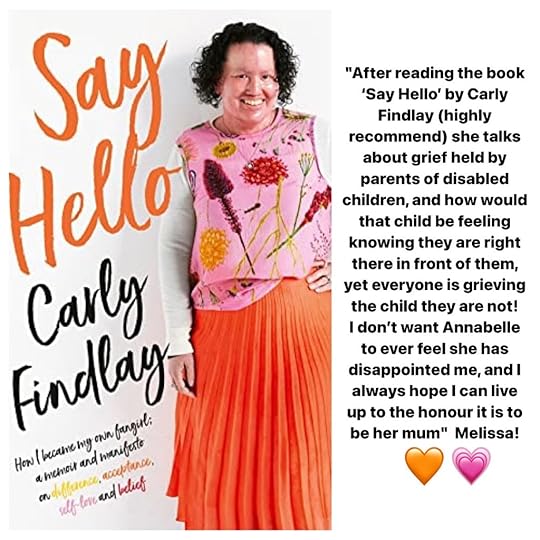
This is why I write. Thank you for this incredible feedback, Melissa. (Melissa made a beautiful Instagram reel featuring her daughter and these words.)
I love that Say Hello is still making a difference to so many people. In the chapter about grief and hope, I wrote “It’s hard to feel proud when someone is grieving a life that could have been. when you’re still here.”
Say Hello is available in worldwide in paperback, ebook, audiobook and large print on demand formats – in bookstores and libraries.
Image: a book cover and text side by side. The book cover features a woman with red face and short dark curly hair, smiling. She’s wearing a pink floral top and bright orange skirt. Her hand is on her hip. Curly orange text reads “Say Hello”, and black text reads “Carly Findlay
How I became the fangirl of my own story – a memoir and manifesto on difference, acceptance, self love and belief”. Text reads: “After reading the book ‘Say Hello’ by Carly Findlay (highly recommend) she talks about grief held by parents of disabled children, and how would that child be feeling knowing they are right there in front of them, yet everyone is grieving the child they are not!
I don’t want Annabelle to ever feel she has disappointed me, and I always hope I can live up to the honour it is to be her mum! “
August 28, 2023
Allyship and friendship – part two
I wrote this in April. Read part one here.
I’ve been thinking about how much of the work I do relates to access in employment and the arts. But what about access in friendships and other relationships? It’s just as important. And why isn’t it fought for – and honoured – like in the aforementioned areas?
Late last year I chose to end a friendship because my now ex-friend consistently invited me to inaccessible events. The events were held outside, and were not comfortable for me to attend. There were inside options for those events, but this friend opted for the outdoor events.
I raised this a number of times, over more than a year, with other friends witnessing my access request.
I was told that if I wanted to attend an accessible event, I should organise it myself, this friend just wants to have fun.
And I do regularly organise accessible events – in my many types of work and in my social life. But it’s also not up to me to have to do all the work.
I left the group chat.
This whole situation has not been addressed with me. Instead I was ghosted. I haven’t received an apology. I quietly let that friendship go.
To me, friendship means honouring each other’s access needs – even when they are competing, and especially when they are an easy fix.
It’s about asking someone if they have access needs when inviting them to an event, and trying to find an activity, venue or location that is suitable.
It’s about eliminating ableist words from our vocabulary, listening to feedback and realising the harm they can do.
It’s about holding space for each other – and acknowledging that requesting accessible events and venues doesn’t mean that we are being difficult, or that we are trying to remove the fun from a situation.
It’s about being vaccinated (against all sorts of communicable diseases) to protect yourself and those around you, being honest if you’re not, and staying away from your vulnerable friends when you’re sick.
It’s about not guilting or shaming us for our access needs.
It’s about not constantly ignoring our accessibility requests, or say accessibility is not fun.
It’s about not getting defensive or closing off when we have these conversations.
And it’s about not ghosting us for months after we’ve been deemed as “difficult” in asking for accessibility.
As Alice Wong, Sandy Ho and Mia Mingus have said, “Access is Love”. A motto I strive to live by, and I hope that my friends adopt too.

Some quick tips for being an ally as a friend:
Ask about your friends’ access needs – and aim to meet them. Birthday parties, spa days, drinks, entertainment events. Contact the venue to ask if it’s accessible – does it have steps at the entrance, is there an accessible toilet that can be used unassisted, is there a lift, is it inside or outside – etc. Decide whether the venue is suitable for your event – rebook if necessary. Let your friends know about the venue’s access provisions before your event. Advocate for better access if the venue isn’t accessible.
Eliminate ableist language from your vocabulary. Unlearning this takes work. Instead of using a disability slur to describe someone who has behaved badly, describe their behaviour. Talk to your other friends and family when they use ableist language – explaining how harmful these words are, even when not directed at disabled people.
Recognise and respect your friends’ limitations. If they can’t come out with you on the weekend, go to them.
Wear a mask. Covid isn’t over, and wearing a mask not only protects you but shows your disabled friends that you love and want to keep them safe.
Sit with your discomfort when called in about your ableism. Don’t get defensive. Work at being a better ally.
Your disabled friend being stared at or ridiculed isn’t about you. If you’re embarrassed or uncomfortable about this happening to your friend, think about why? Don’t centre yourself in these situations. Imagine what it’s like for your disabled friend to endure this day in, day out.
Help advocate when your friend is dsicromated against. Write letters explaining the discrimination or inaccessibility, call for the org to do better.
Has this post helped you think differently about disability and appearance diversity? Will you use it in your work? Please consider buying me a drink. Thanks!
August 27, 2023
Allyship and friendship – part one
I wrote this in December 2022.
Most of the time I advocate for accessibility for the broader disability community as it relates to other disabled people. Only occasionally do I advocate for accessibility for myself. It is harder to advocate for access for myself, as so often disabled people are seen as difficult, party poopers, too political.
I often say a line in my speeches – ensure accessibility, from the boardroom to a birthday party, because it makes people feel welcome. And I also refer to the Disability Visibility Project’s initiative, Access Is Love – meaning by ensuring accessibility, you’re showing someone they are loved.
If someone says that a venue or event isn’t accessible to them, don’t tell them to organise something themself.
Do better as an ally and be the one to ensure accessibility, don’t expect the disabled person to do all the heavy lifting in enquiring about accessibility, and speaking up about in accessibility.
If someone tells you they feel excluded by your behaviour, don’t gaslight them by saying you’re not excluding them.
If someone says something isn’t accessible for them, don’t be the devil’s advocate and say how much that thing has benefited you because it was accessible to you.
Asking for accessible venues and events doesn’t mean they’re doing to be less fun.
Expecting us to leave our disabled identity behind hurts.
Asking us to do all the work so you don’t have to think about accessibility is exclusionary and privileged.
When you endure discrimination by those close to you – be it family, friends, colleagues, teachers, medical professionals, and people who should know better, it hurts the most. And it takes a lot more work to practice pride.
I’ve worked hard this week – not just at paid work, but also at practicing disability pride.
I think about Laura Hershey’s poem You Get Proud by Practicing a lot.
“Remember, you weren’t the one Who made you ashamed,
But you are the one
Who can make you proud.
Just practice,
Practice until you get proud, and once you are proud, Keep practicing so you won’t forget.
You get proud
By practicing.”
Has this post helped you think differently about disability and appearance diversity? Will you use it in your work? Please consider buying me a drink. Thanks!
August 20, 2023
This is Gonna be Big film at MIFF
This afternoon I saw This is Gonna be Big at Melbourne International Film Festival.
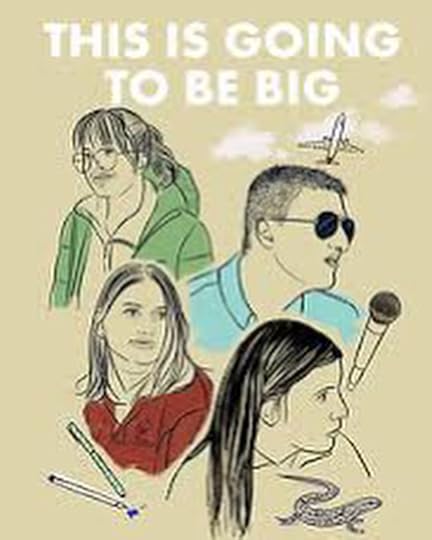
Directed by Thomas Charles Hyland, This is Gonna be Big is the coming of age story of students at Sunbury and Macedon Ranges Specialist School’s Bullengarook campus. The film documents the school performing a John Farnham themed musical – we see auditions, character development, rehearsal, set making and all the nerves and the excitement involved in a high school musical. The musical is about time travel, celebrating four decades of John Farnham, including his mullet.
The film focuses on a few lead performers – Josh, Elyse, Chelsea and Halle, and also features many of the students in supporting roles. It also highlights the dedication of the school’s teachers and the students’ parents. The film is filled with humour, love and encouragement. The disabled people are leading the way – both in the production and how they’re depicted in the film. They’re funny, honest, clever, reflective, driven and determined. There’s no inspiration objectification here.
The film was inclusively made, in partnership with Bus Stop Films. There was a line in the film where Josh said he wants the performance to help raise people’s expectations of disability, to see we are capable of so much. And the performance, and film, sure did that. Brilliant. This is Disability excellence, leadership and pride.
This is Gonna Be Big won two awards at MIFF – the Audience Award and Schools Jury Award. Congrats, everyone!
I can’t wait to see what the young people in This is Gonna be Big do next! Superstars! And I can’t wait til the film is screened widely so more people can see it.
Visibility is possibility and I hope that drama and film schools, and production companies, see this film and give these talented young people a chance.
Image: an illustrated poster of This is Gonna be Big film – featuring four young people – Elyse, Chelsea, Josh and Halle. Planes and musical instruments surround them. The background is beige.
August 7, 2023
Chatting with Chloe Hayden on Boldly Me podcast
I’ve been a fan and friend of Chloe Hayden for a long time, and today I am on her podcast – Boldly Me.
We chat about ableism, my journey to acceptance and pride, activism exhaustion, identifying as a woman of colour and my experience of being catfished- plus more. This was such a fun chat – I hope you enjoy it! You can listen to the podcast here.
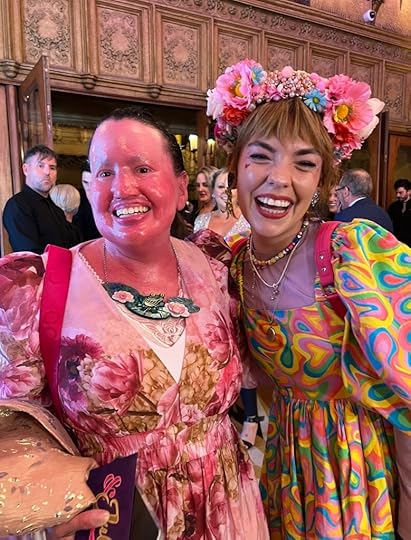 Image: Carly and Chloe, dressed up and smiling on a red carpet.
Image: Carly and Chloe, dressed up and smiling on a red carpet. Chloe Hayden is so talented – a total trailblazer for Neurodivergent and Disability representation. Check her out on Heartbreak High on Netflix, and previous episodes of her podcast on your fave podcast app. She’s interviewed some great people including Taryn Brumfitt, Tim Minchin and Tsehay Hawkings. 
August 1, 2023
Grateful 💕
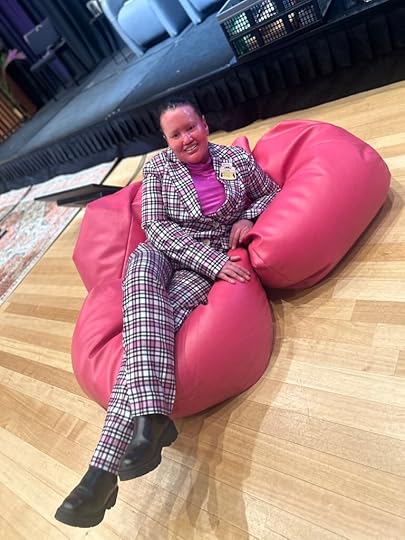
Hey friends!
Thanks for your support during July – it was a big month! It was Disability Pride Month; I was involved in some big events; I was quite sick; and I went away to NSW and QLD for work. Your lovely comments, which genuinely show appreciation and excitement for my work and life, means a lot.
I made myself smaller online for a while there, but my confidence is coming back. It feels good. I’ve created a lot of new content – and I know it’s been useful for you!
One friend told me their young relative is doing a school assignment about me! Another said my work has helped them eliminate ableist language from their vocab. I was recently a sensitivity reader for a book written by one of my teenage idols-turned friend! Wow!
There are a few ways you can support me:
You can book me to speak at your work or school – use the contact form to get in touch.
You can share my social media and blog posts. And you can buy me a drink if my work has helped you, or if you’re using it in your work. There’s PayPal and Patreon links here. Thank you!
This pic was taken at the start of the month, just before I hosted an event at the State Library. It feels incredible to be doing so much meaningful and enjoyable work right now. Grateful.
Image : Carly, a woman with red skin, short curly hair tied back, wearing a pink, black and white tartan suit over a hot metallic pink top , black boots and a typewriter brooch with paper in it that has text “read books by disabled writers”. She’s smiling, lying on pink beanbags on a wooden floor. A stage is behind her.
July 30, 2023
Some love, and reassurance, from me at the end of Disability Pride Month
Dear Disabled friend – here’s some love at the end of Disability Pride Month.
Save this for yourself, or send it to a Disabled friend who you think might like to hear or read these words  An instagram version of this video is here.
An instagram version of this video is here.
Video: Carly, a woman with a red face and short dark curly hair, wearing a colourful floral jumpsuit, talking to camera. There are captions on the video.
The transcript is “Dear Disabled friend,
At the end of Disability Pride Month, I want to say a few things.
You are allowed to call yourself disabled, and you’re most welcome in the disability community – even if your disability is not visible or you don’t think it’s “severe” enough or you haven’t received an official diagnosis. There’s no gate-keeping from me.
You are allowed to experience joy – big or small, and even when you’re in a pain flare or have experienced ableism or discrimination.
You are allowed to earn money.
You can have individual success and should celebrate your achievements and not apologise for them. You also shouldn’t apologise for being disabled or your access needs.
You are allowed to be happy.
And you’re allowed to rest – to show love to your body and mind, and also to take a break from fighting injustice. Ableism can wait.
Disability pride takes work. Some days you may be prideful, and some days your body, mind, voice or senses may mean that your disability pride takes a back seat. That’s ok – you’ll find pride again soon. Identifying as disabled and finding disability pride can be liberating – and it’s not just for the month of July.
And finally, you are allowed to love yourself, and to be loved.
Happy Disability Pride Month. I’m proud of you, and proud to be a part of the disability community. “
When disabled people “play victim” to “boost our profile”
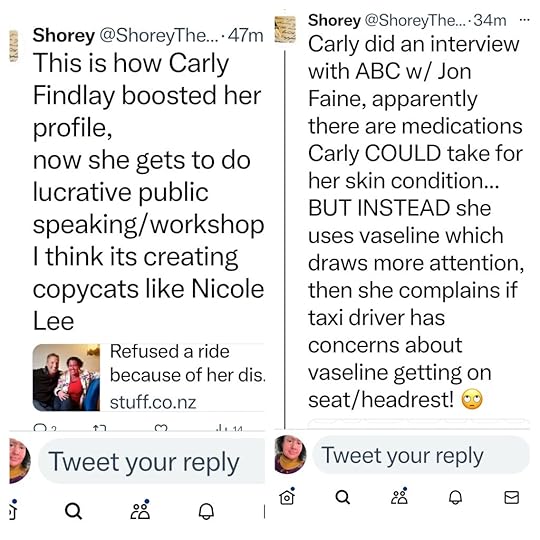
CW: ableism.
Happy end of Disability Pride Month! This is said with much sarcasm.
I was alerted to these tweets today – they’re a part of a vulgar Twitter (or whatever it’s called now) thread which targets and demonises a number of high profile disabled people, including me, for playing the victim in order to gain a public profile.
I have no doubt this person is someone I know; that they are someone who takes issue with disabled people’s success.
I have (jokingly and publicly ) said that when I am discriminated against, it creates more writing fodder. This is true – it does. I’ve written about ableism and discrimination on my blog and news outlets, and spoken about it at in the media and at events.
And while speaking out can create change – it’s very slow to happen; doing so comes as a cost. Speaking out publicly about ableism and discrimination we endure as disabled people brings more ableism and discrimination – including disbelief that the incident occurred and devil’s advocates justifying why it happened.
I’ve never made up instances of discrimination that’s occurred because of the way I look – and I don’t talk about every time it’s happened. And I’ve never orchestrated discrimination to create work or to boost my profile. That’s come through years of hard work, rejections, lateral violence and exhaustion.
I also choose not to take the retinol medication that this troll has mentioned in one of their tweets because I have done at two different stages of childhood and it didn’t work for me. The side effects were very bad. Paraffin ointment is what works best for me, and I don’t use it to be difficult towards taxi drivers. Not that I need to justify my decisions.
Disabled people speaking out about ableism and discrimination; and also having a public profile; can really rattle some. The lengths people will go to to discredit us are laughable, and sometimes hurtful. And this is the reason so many disabled people stay silent about abuse.
I would love it if disability and discrimination weren’t the main reasons I speak to and write for the media. (But that is slowly changing.) I’d love it if discrimination and abuse didn’t happen to me and other disabled people. I’d love to be believed all the time. And it would be such a relief if the secondary ableism – like these tweets – didn’t happen when we speak out. Response and beliefs like these happens to almost every disabled person I know when they make ableism and discrimination public. The complaints processes are so broken that speaking publicly to media and on our platforms is often the last resort. When someone asks me for advice posting about a terribly ableist situation on their social media, I ask them if they are aware of and prepared for the blacklash they’ll most likely receive. It shouldn’t be this way, but it is.
I have been working in the media and activism space for more than a decade. There’s been shit like these tweets; and there has also been payment – for my work, not for pity – and joy. So much joy. Sometimes I get to go on a red carpet – which actually isn’t as glamorous as it looks, and is never paid. I’m here to tell you that disabled people are allowed to earn money. We are allowed to tell our stories publicly and unapologetically – we are not playing the victim. We can experience perks – like the ones non disabled people enjoy. And we can have joy in our lives. We are allowed to be happy and loved. People like ShoreyThe3rd want us to go away. And I’m not going anywhere.
Image above : two tweets, side by ShoreyThe3rd. 1. “This is how Carly Findlay boosted her profile, now she gets to do lucrative public speaking/workshops. think its creating copycats like Nicole Lee”
2. “Carly did an interview with ABC w/ Jon Faine, apparently there are medications Carly COULD take for her skin condition…
BUT INSTEAD she uses vaseline which draws more attention, then she complains if taxi driver has concerns about vaseline getting on seat/headrest! ”
”
[There’s a screen shot to an article about ichthyosis treatments including retinol below.]



